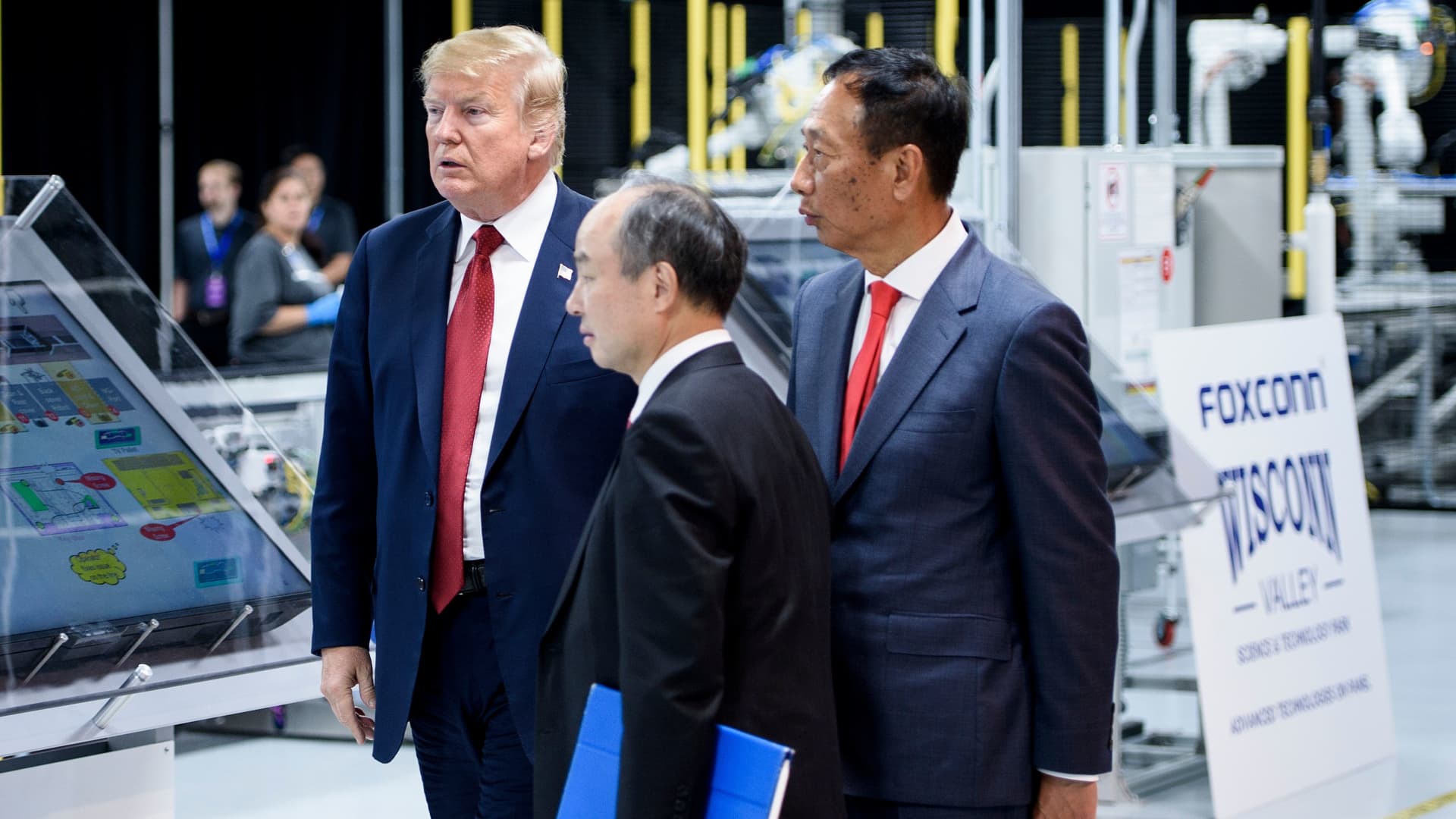President Donald Trump and Foxconn Chairman Terry Gou (R) tour a Foxconn facility at the Wisconsin Valley Science and Technology Park on June 28, 2018, in Mount Pleasant, Wisconsin.
Brendan Smailowski | AFP | Getty Images
More than 11% of the world’s more than 2,000 billionaires have run for election or become politicians, according to a study highlighting the growing power and influence of the super-wealthy.
While billionaires have had mixed success at the ballot box in the U.S., billionaires around the world have a “strong track record” of winning elections and “lean to the Right ideologically,” said the study, which is by three professors at Northwestern University.
“Billionaire politicians are a shockingly common phenomenon,” the study said. “The concentration of massive wealth in the hands of a tiny elite has understandably caused many observers to worry that the ‘super-rich have super-sized political influence.'”
With Donald Trump now on his third straight presidential campaign, out-polling ultra-wealthy GOP candidates Vivek Ramaswamy and Doug Burgum, billionaires and multi-millionaires are once again playing a large role in the national elections.
In the 2020 race, billionaires Michael Bloomberg and Tom Steyer made unsuccessful bids for the Democratic nomination despite spending over $100 million of their own fortunes. Billionaire Rick Caruso lost a bid for Los Angeles mayor last year after spending $104 million on his campaign, while billionaire J.B. Pritzker is governor of Illinois after spending over $350 million to win his two races.
Outside the U.S., billionaire politicians are even more common. Terry Gou, the Taiwanese billionaire and founder of Foxconn, is running for president of Taiwan. Other billionaire leaders have included Andrej Babiš of the Czech Republic, the late Silvio Berlusconi of Italy, Bidzina Ivanishvili of Georgia, Najib Mikati of Lebanon, Sebastián Piñera of Chile and Thaksin Shinawatra of Thailand.
Of course, billionaires wield even more political power through their (often secret) donations to support candidates, parties and super PACs. Billionaires donated a record $881 million to the U.S. political parties in the 2022 federal midterm elections, with 14 of the top 20 donors donating to Republicans, according to Americans for Tax Fairness.
Billionaire donors started pouring money into the 2024 race, as well, including casino mogul Phil Ruffin, tech magnate Larry Ellison, investor Nelson Peltz, packaging tycoon Richard Uihlein, money manager Jeffrey Yass, investor Stanley Druckenmiller, and hedge-funders Cliff Asness, David Tepper and Bruce Kovner.
Illinois Governor J.B. Pritzker speaks on the day U.S. President Joe Biden delivers an economic policy speech at The Old Post Office in Chicago, Illinois, June 28, 2023.
Leah Millis | Reuters
The new study of billionaire politicians was conducted by Daniel Krcmaric, Stephen C. Nelson and Andrew Roberts at Northwestern and published by Cambridge University Press on behalf of the American Political Science Association.
The study analyzed the 2,072 billionaires on the Forbes list who entered politics as billionaires. It excluded those who made their fortunes mainly from political office, or who became billionaires after leaving politics. Russian President Vladamir Putin, for instance, was not included in the study since he isn’t on the Forbes list and made his reported fortune after entering politics.
Along with those elected to office, the study included billionaires who have held cabinet-level positions, key government roles and ambassadorships. It found that a majority billionaires holding several political roles over the course of their careers.
The 242 billionaires who have held some type of political office held an average of 2.5 political posts during their lifetime, according to the study. French billionaire Serge Dassault, for instance, held or ran for 16 different posts throughout his political career.
“In a variety of ways, billionaires tend to play sustained and significant roles in their countries’ political systems,” the study found.
Former mayor of New York Michael Bloomberg speaks during a meeting with Earthshot prize winners and finalists at the Glasgow Science Center during the UN Climate Change Conference (COP26) in Glasgow, Scotland, Britain, November 2, 2021.
Alastair Grant | Reuters
Billionaires are far more successful in autocratic and authoritarian regimes than in democratic governments. According to the study, the “rate of political entry” for American billionaires is 3.7%, well below the global average over 11%. China has the highest rate of billionaire politicians in the world, according to the study. China has 116 billionaires in government, representing a 36% billionaires-in-politics rate.
Hong Kong ranked second, with 31%, followed by Russia with 21%. Japan and Australia don’t appear to have any billionaires directly in politics, according to the study.
‘We surmise that this is due to stronger wealth-protection motives for political entry in autocracies and the wide array of ‘stealth’ pathways to informal political influence in democracies,” the study said.
While billionaire candidates in the U.S. often fail, they have a high success rate globally. Of 198 direct elections featuring at least one billionaire, billionaire candidates prevailed in 158 or 80%, according to the study.
When looking at party affiliation and ideology, the study found that billionaires typically lean more conservative. Measured along the political spectrum, three quarters of billionaire politicians “were to the right of the median,” the study said. American billionaires are 2.5 times more likely to be affiliated with the Republican Party than the Democratic Party. In Europe, billionaire politicians leaned even more to the right.
The study said the rich and affluent are generally “more likely to embrace fiscal conservativism and oppose social spending programs, prize efficiency over equality of outcomes, view economic inequality as a result of individual choices and characteristics rather than structural factors, and compete over social status.”

